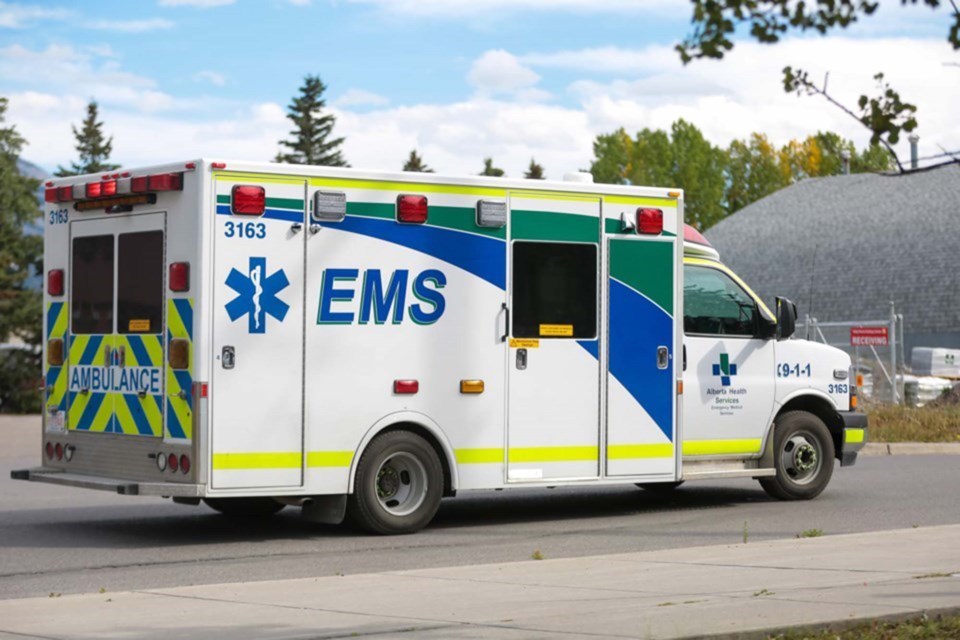Mayor Cathy Heron says the province's vow to implement over 50 recommendations for improving the Emergency Medical Services network is a step in the right direction.
Alberta Health Minister Jason Copping announced on Jan. 16 the final report from the EMS Provincial Advisory Committee, which Mayor Heron served on, was being made public, as was a report on the EMS dispatch system by consultants from PricewaterhouseCoopers (PwC). He said a plan is being developed to implement all recommendations in both reports.
"I said right from the very beginning that it seems like Minister Copping is very dedicated to finding a solution to EMS in Alberta, so this is just another piece of evidence that I see as proof of his dedication," Heron said.
"An enormous amount of time went into — by myself and the rest of the committee representatives — [developing those] 53 recommendations, and if some of them were just dismissed, that would have nullified all the time and effort we put in," she said.
The province established the advisory committee in January last year. It included representatives from the Alberta College of Paramedics, Alberta Fire Chiefs Association, Alberta Municipalities, Alberta Health Services (AHS), Health Sciences Association of Alberta, and more, as well as three MLAs. A full list of committee representatives is included in the final report on the province's website.
Last May, the province announced 10 initial recommendations were to be implemented immediately, including the development of guidelines for paramedics handing patients off to hospital emergency departments. Those guidelines were announced at Copping's Jan. 16 news conference.
"Response times are too long, and we have to get them back down, and that means adding resources and using new strategies to make sure our paramedics can be there when they're needed," Copping said.
The committee's remaining 43 recommendations include strategies to improve EMS capacity, system performance, and working conditions for first responders.
St. Albert operates an integrated emergency fire and medical services system, meaning first responders are cross-trained as firefighters and advanced care paramedics.
St. Albert's Firefighter Union president Greg Harvey told The Gazette he wants to see the recommendations implemented soon.
"Reports are good on paper, but the action is going to be where it really matters," Harvey said.
A recommendation to "enhance the ability of EMS staff to take scheduled breaks and discretionary time off," illustrates the pressure first responders are under, Harvey said.
"You shouldn't have to put into a report that breaks and the ability for a little bit of rest while you're working is something that needs to be mandated," Harvey said.
"We know what our job is, we love doing our job, but the reality is when you don't get breaks — you don't get a chance for even a bio-break or to just eat your lunch — that really starts wearing on people mentally and it leads to more problems down the road."
Dispatch review
The PwC EMS dispatch review comes after the dispatch centres in Calgary, Lethbridge, Red Deer, and Wood Buffalo were consolidated into a centralized system in 2021.
The report states the centralized dispatch system in Alberta largely follows leading practices in other jurisdictions in Canada and around the world, but has room for improvement.
One key recommendation is providing EMS dispatchers and paramedics with access to electronic health records for patients.
"To evolve away from episodic care, patient's health information needs to be made available to call evaluators and responding paramedics," the report says.
"AHS EMS dispatch should look to incorporate this information into their systems and processes to provide call evaluators visibility into past treatments, current medications, and chronic illnesses so that the most appropriate care can be provided."
Harvey said having access to a patient's history could be helpful in certain situations, but there typically isn't time to learn a patient's history before arriving at a 911 call.
"It would help, but I don't think it would help us on a daily basis having the ability to look at those unless we're treating and referring on scene, which is another one of the recommendations," Harvey said.
The committee recommends the province pilot a project to legally allow paramedics to treat patients at the scene of a call, when appropriate.
"It's nice to have the ability to make those decisions, but the issue lies with the liability. If there's something that goes wrong, then it falls directly on the practitioner who made the decision," Harvey said.
"The mindset in the industry right now is you make the call on the spot and you transport for personal liability protections, which isn't always the best case for patient care and just transport everybody to a hospital."
The dispatch review report says between 2017 and 2022, Alberta's EMS capacity has been expanded by 2.2 per cent, despite call volumes and emergency events increasing by 39 per cent over the same period.
"Alberta had expanded total capacity by 2.2 per cent, but due to staffing challenges actual system growth was only 0.8 per cent," it states.
"When we consider the considerable growth in workload for the EMS system driven by an increased volume of events and time to complete each event contrasted against stagnant system capacity, the overall EMS system is under considerable strain."
The Gazette contacted the health ministry to see if and when the plan to implement the recommendations will be made public, but did not receive a response.




